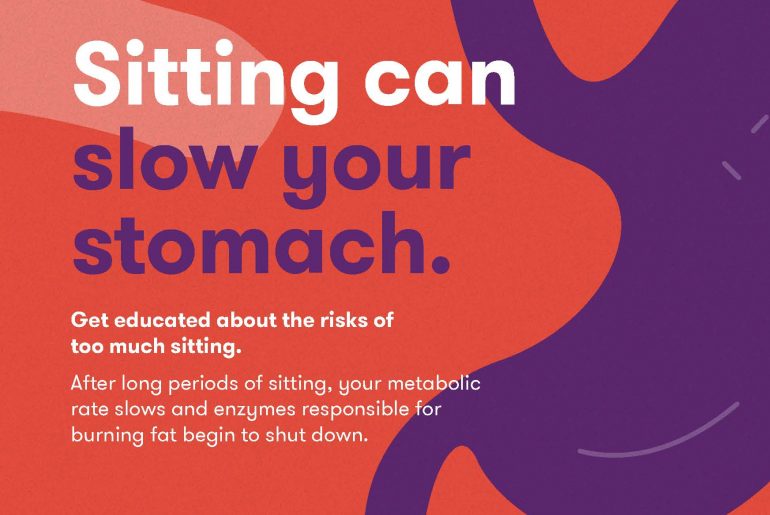Have you ever experienced stomach pains, discomfort, or indigestion after sitting too long at your desk? While exercise has long been anecdotally thought to influence digestion, more recent research has been exploring the impact of physical inactivity on digestion. This post will explore some ways exercise and inactivity influences your gut, as well as the implications for your health. But first, what does it mean to say that sitting “slows your stomach?” One way to consider it would be gastric emptying, or the movement of stomach contents into the small intestine (how quickly food leaves the stomach). Another possibility is gastrointestinal transit time, which is the time it takes something you eat to move from your mouth through your entire gastrointestinal tract. Both these definitions have been linked to physical activity and inactivity, as have health outcomes such as constipation and colorectal cancer. How physical inactivity slows your stomach: When you aren’t moving, your gut isn’t moving much either. An extreme example can be seen in people who are confined to bed or held immobile. Hospital inpatients are another population at risk of prolonged physical inactivity, and increased rates of constipation are seen in this population. However it can be…
Health experts recommend standing up at desk….
This post from satirical site the Onion is an “oldie” but a goodie (first published 02/06/15). Health experts recommend standing up at desk, leaving office, never coming back ROCHESTER, MN—In an effort to help working individuals improve their fitness and well-being, experts at the Mayo Clinic issued a new set of health guidelines Thursday recommending that Americans stand up at their desk, leave their office, and never return. “Many Americans spend a minimum of eight hours per day sitting in an office, but we observed significant physical and mental health benefits in subjects after just one instance of standing up, walking out the door, and never coming back to their place of work again,” said researcher Claudine Sparks, who explained that those who implemented the practice in their lives reported an improvement in mood and reduced stress that lasted for the remainder of the day, and which appeared to persist even into subsequent weeks. “We encourage Americans to experiment with stretching their legs by strolling across their office and leaving all their responsibilities behind forever just one time to see how much better they feel. People tend to become more productive, motivated, and happy almost immediately. We found that you can also…
What happens when we sit for too long?
When you sit you are spending very little energy and your large postural muscles aren’t working very hard. This means your metabolism starts to slow down which can lead to poor health outcomes in both the short and long term. Too much sitting has been linked to an increased number of musculoskeletal conditions, as well as increased risk of overweight or obesity, type 2 diabetes, cardiovascular disease, some cancers and premature death. Time to stand up?
Feeling foggy? It might be time to get up…
The following article was published in The Conversation on July 27th, 2017. Could too much sitting be bad for our brains? Sitting affects our glucose levels, which affects our brain. Unsplash/Andrew Branch, CC BY-SA Michael Wheeler, University of Western Australia; Daniel Green, University of Western Australia; David Dunstan, Baker Heart and Diabetes Institute, and Paul Gardiner, The University of Queensland In many aspects of life where we need to use our brain power, we also tend to sit down: at school, at work, sitting exams or concentrating on a crossword. In a new paper, we explore how prolonged sitting may affect the brain’s fuel supply and have a negative impact on brain health. The brain is a glucose hungry organ. It weighs about 2% of body mass but demands about 20% of our resting energy requirements, which is mostly in the form of glucose, the primary brain fuel. If this energy supply is disrupted it can impair and even damage brain cells. Therefore, the availability of glucose to brain cells may have implications for brain health. Exposure of the brain to both high glucose levels and low glucose levels can increase the risk of developing dementia. Also, switching between a…




